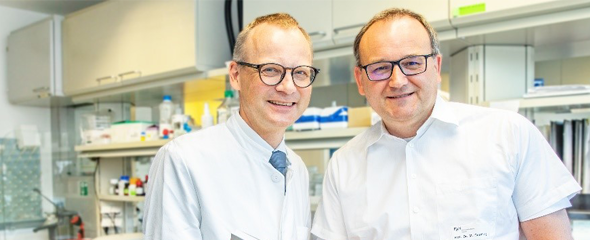Hepatitis D is caused by coinfection of hepatitis B patients with the hepatitis D virus (HDV). Up to 20 Million individuals are infected with HDV worldwide including about 250.000 patients in the European Union. There is very limited knowledge on disease pathophysiology and host-virus interactions explaining the large interindividual variability in the course of hepatitis D. It is in particular unknown why 20-50% are spontaneously able to control HDV replication, why the majority but not all patients progress to advanced stages of liver disease and why only some patients show off-treatment responses to antiviral treatment. As HDV is an orphan disease, no multicenter cohorts of HDV infected patients are available with appropriate biobanking. There is also no reliable animal model available allowing to study host responses.
“Hepatitis D is a prototype infectious disease which could benefit tremendously from a novel individualized infectious medicine approach based on a better understanding of the host immune response against Hepatitis D Virus (HDV) and identification of distinct immune biomarkers,” says Prof Heiner Wedemeyer, head of MHH Department of Gastroenterology, Hepatology and Endocrinology (GHE) and D-SOLVE project leader. D-SOLVE aims to personalize patient surveillance strategies and antiviral treatment approaches which should reduce disease burden, improve patient’s quality of life and safe direct and indirect costs caused by HDV infection.
“In order to individualize the treatment of infections, various aspects such as pathogen and host factors, pathogen-host interactions and also therapeutic influences must be elucidated in AI-supported Big Data approaches from different angles, “ highlights Prof Markus Cornberg, Chief Senior Physician at GHE, clinical director of HZI and director of CiiM. “With the D-SOLVE consortium, we have succeeded in bringing together exceptional clinical, immunological, bioinformatical and virological expertise in the field of HDV from leading centers in Europe.” The national and international partners will pursue three key clinical questions, namely virus control, disease progression and antiviral treatment response, across four translational research work packages.
Virological features of HDV infection will be investigated (WP lead Dr Lisa Sandmann and Prof Heiner Wedemeyer, MHH), several layers of sophisticated molecular characterization in a broad and unbiased biomarker screening approach will be applied (WP lead Prof Yang Li, Director CiiM and Department Head at Helmholtz Centre for Infection Research, HZI, Germany), distinct innate and adaptive immune responses in the peripheral blood and the liver of HDV infected patients will be studied (WP lead Prof Niklas Björkström, Karolinska Institutet, Sweden, and Dr Helenie Kefalakes, MHH), and effects of identified molecules will be applied in mouse models – which could also lead to novel antiviral strategies (WP lead Prof Thomas Baumert and Dr Joachim Lupberger, INSERM, France).
Basis will be a multicenter cohort of well-defined HDV patients. More than 500 patients will be included at the study sites MHH, Germany, Policlinico of Milan, Italy (Prof Pietro Lampertico), Karolinska University Hospital, Sweden (Prof Soo Aleman) and National Institute for Infectious Diseases "Professor Doctor Matei Balș", Romania (Prof Florin Caruntu). Furthermore, an IIT (investigator-initiated trial) will investigate in which patients a discontinuation of therapy could be beneficial.
As the data involved in the project contains highly sensitive information, D-SOLVE pay particular attention on the data management system and its trustworthiness by performing comprehensive risk assessments and establish secure data exchange (WP lead Dr Yang Zhang, CISPA, Germany).
“The project runs for four years and will start in October 2022 with a kick-off meeting planned along the Delta Cure Meeting in Milan, Italy,” says Dr Jennifer Debarry, consortium coordinator at CiiM, and adds “but preparation for the IIT already started and first patients are planned to be enrolled early 2023.”
Funding
The D-SOLVE consortium is funded by the European Union in the Horizon Europe Framework Programme (HORIZON) under grant agreement No 101057917.
To the D-SOLVE project page
